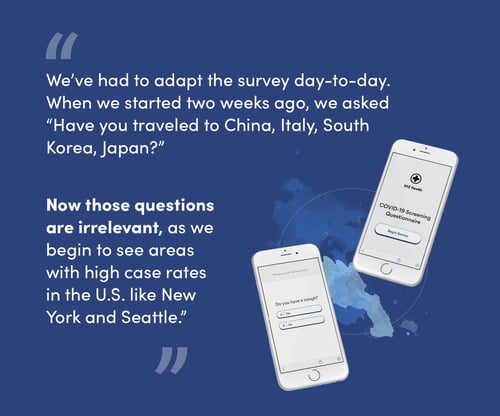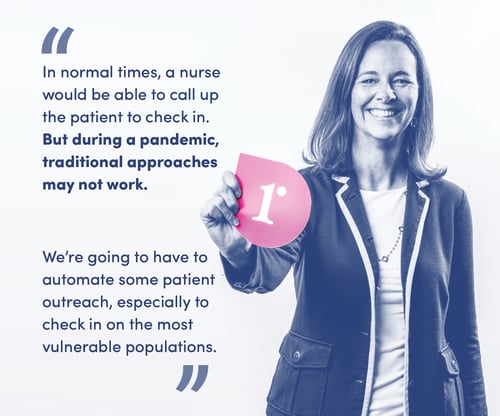This interview is part of a series about innovative startups in Village Capital's network that are responding creatively to the challenges raised by COVID-19.
Every day recently has brought new reports about the lack of testing capacity in the United States for the novel coronavirus COVID-19, and concerns about overcrowded hospitals where infections can spread if not held in check.
Rimidi, a VilCap Investments portfolio company, is a digital health startup that helps healthcare providers better manage patients with chronic diseases. Two weeks ago, in response to news about the growing crisis, Rimidi launched a screening and triage tool for hospitals to help limit the spread of COVID-19 in emergency rooms and other healthcare settings.
The tool is a survey for patients with chronic health conditions or upcoming appointments, sent via text message in collaboration with patients’ health providers. The survey inquires about the patients’ symptoms and potential exposure to COVID-19, in accordance with the latest CDC guidelines. If a patient is experiencing certain symptoms or reports exposure to the virus, the app directs them to appropriate next steps, as defined by their local health systems. The survey is designed to interface with existing systems that healthcare providers use, like the Electronic Health Record.
The following interview with Rimidi founder & chief health innovator Lucienne Ide, Md, PhD has been edited and condensed for clarity.

On the evolving nature of the survey:
We’ve had to adapt the survey day-to-day as COVID-19 continues its spread around the world. When we started the survey two weeks ago, the questions were along the lines “Have you traveled to China, Italy, South Korea, Japan?” Now those questions are irrelevant, as we begin to see areas with high case rates in the U.S. like New York and Seattle. We keep our survey up-to-date with the latest screening guidelines from the CDC, which are changing rapidly.
The original vision for the survey was to catch potentially infectious patients before they come in for a scheduled appointment and triage them elsewhere to limit the spread in healthcare settings. Now, many doctors’ offices are cancelling regularly scheduled appointments for patients with chronic diseases – they just don’t have capacity. A lot of patients are seeing their appointments now booked for six months out, or switched entirely to telemedicine. [This week the Trump administration expanded Medicare coverage to include telemedicine].
As the situation evolves, we see this tool as a way to reach specific groups of high-risk patients (patients with HIV, Type 2 Diabetes, etc.) and to continually monitor quarantined patients’ symptoms. We don’t want people to feel like they have been told to stay home and then be forgotten about for the next month. It’s going to take all of us doing everything we can, but I think there's a real simplicity to just continuing to ask people, “Hey, how are you doing? What’s your mood like today? Do you have access to food and your usual medicine?”
On why this app is deployed through health systems instead of direct to consumers:
We’re a B2B company, with our primary customers being healthcare providers -- large health systems, hospitals and primary care clinics. We’re pushing the survey out through healthcare systems for a couple of reasons:
First, we’ve always worked with the big electronic health record (EHR) companies like Epic, Cerner, and Athenahealth. We feel very strongly that connecting this back into each individual's health record and into the health systems workflow is really important from a scalability point of view as hospitals navigate new workforce challenges. And these EHR industry partners have been incredibly responsive in making this available to all of their clients, while still working to protect privacy and personal health information.
It would usually take close to a year to build a new product and get it approved across the different vendors, and we’ll get it done in three weeks. That’s amazing. Second, it’s important for patients to feel connected to their healthcare provider during a pandemic. People who are self-isolating to feel like they are staying connected to the outside community - that there are people looking out for them.
 In normal times, a nurse would be able to call up the patient to check in. But during a pandemic, traditional approaches may not work - we’re going to have to automate some of the patient outreach for clinicians or engage clinicians who are self-isolating at home, especially to check in on the most vulnerable populations.
In normal times, a nurse would be able to call up the patient to check in. But during a pandemic, traditional approaches may not work - we’re going to have to automate some of the patient outreach for clinicians or engage clinicians who are self-isolating at home, especially to check in on the most vulnerable populations.
On the importance of standardized data:
In a situation like this, being able to share data really quickly in a standardized format is super important. Thankfully, earlier this month, The Office of the National Coordinator for Health Information Technology (ONC) finalized long-awaited rules on data interoperability. The new rules essentially mandate standardized data sharing and prevent healthcare providers, developers of certified health IT products, health information exchanges and other information networks from information-blocking, either from a technical or business practice standpoint.
This is important because historically, health agencies and healthcare providers operated on totally different platforms and totally different data standards, which made data sharing (and therefore researching) very inefficient and not very timely.
Combining the survey data with clinical data all in the same “language” across health systems and different geographic communities, which will be incredibly important to help public health officials identify trends in symptoms, recovery times, mortality rates, experimental treatment efficacy, etc. across different hospitals and geographic locations.
Our newsletters share the latest about our programs, trends, ecosystem leaders, and innovative entrepreneurs in the impact world. Get the latest insights, right in your inbox by subscribing:
Village Capital needs the contact information you provide to us to contact you about our products and services. You may unsubscribe from these communications at any time. For information on how to unsubscribe, as well as our privacy practices and commitment to protecting your privacy, please review our Privacy Policy.